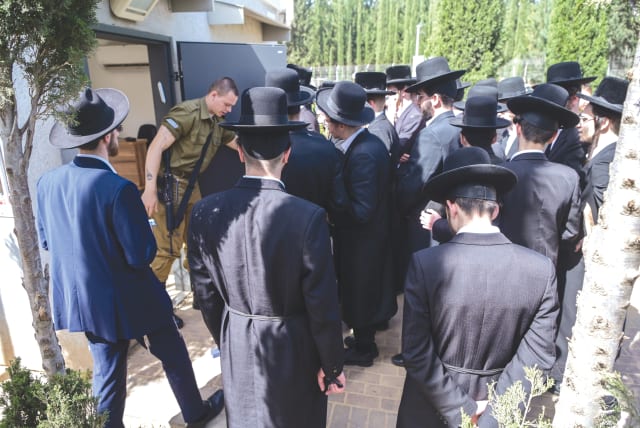IDF cannot focus on drafting only haredim who work, AG says

Limon's letter addressed the fact that the IDF chose to send out its first three thousand draft orders to haredim who were listed as either working or studying in universities.
The IDF cannot continue to draft only haredim who work as opposed to haredim who study in yeshivas full-time, Deputy Attorney General Gil Limon wrote in a letter to the legal adviser of the Defense Ministry on Wednesday.
Limon’s letter addressed the fact that the IDF chose to send out its first 3,000 draft orders to haredim who were listed as either working or studying in universities. The orders are sent in three waves at two-week intervals. The first thousand draft orders were sent out on July 21, and the second wave is scheduled for this Sunday, August 4.
According to Limon, the choice to target working haredim was legally admissible for these 3,000 draft orders due to the IDF’s urgent need for manpower. However, the IDF may no longer make such a distinction in the next batch of orders, which are expected to begin in November, since they unlawfully disadvantaged some haredim compared to others.
Limon also repeated prior demands that the state must present as soon as possible its plan for the coming year to draft 4,800 haredim, as well as its plan to increase this number in the future. The 4,800 haredim include 1,800 who are expected to join existing programs, and an additional 3,000 that the state told the High Court of Justice was its maximum capacity for the upcoming year.
Bill being prepared for second, third readings
The Knesset’s Foreign Affairs and Defense Committee continued to debate a new haredi draft bill on Wednesday morning. The bill on the committee’s table passed its first reading in 2022 and is widely considered irrelevant to the IDF’s post-October 7 needs. Committee chairman MK Yuli Edelstein (Likud) is committed to completely revamping the bill to apply it to current reality.
However, the bill is technically being prepared for its second and third reading, a process that includes a discussion on each clause. Edelstein has therefore chosen to dedicate each committee session to a separate clause based on the existing proposal, with the goal being to approve amendments to all necessary clauses at a later stage.
The clause in question on Wednesday was one that detailed the criteria for haredim to postpone their IDF service. Its goal in the 2022 proposal was to enable haredim who legally postponed their service to join the workforce as early as age 22 without having conducted military service. This clause reflected the stated goal of the 2022 proposal, which was to increase haredi participation in both the IDF and in the workforce.
The FADC’s legal adviser pointed out on Wednesday that the MKs needed to decide whether or not the new bill would include the workforce goal since, if not, the clause in question was not relevant.
Meanwhile, the first 1,000 haredi soldiers who received draft orders last week are scheduled to report for initial check-ups beginning next week. Their level of compliance will indicate whether the IDF will need to ramp up its efforts and send out thousands more summonses in order to meet their recruitment goal.
Jerusalem Post Store
`; document.getElementById("linkPremium").innerHTML = cont; var divWithLink = document.getElementById("premium-link"); if (divWithLink !== null && divWithLink !== 'undefined') { divWithLink.style.border = "solid 1px #cb0f3e"; divWithLink.style.textAlign = "center"; divWithLink.style.marginBottom = "15px"; divWithLink.style.marginTop = "15px"; divWithLink.style.width = "100%"; divWithLink.style.backgroundColor = "#122952"; divWithLink.style.color = "#ffffff"; divWithLink.style.lineHeight = "1.5"; } } (function (v, i) { });

